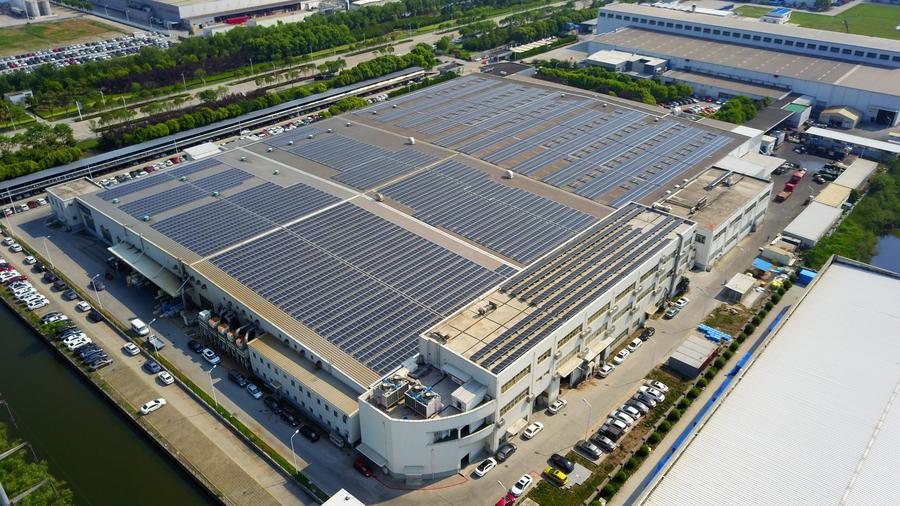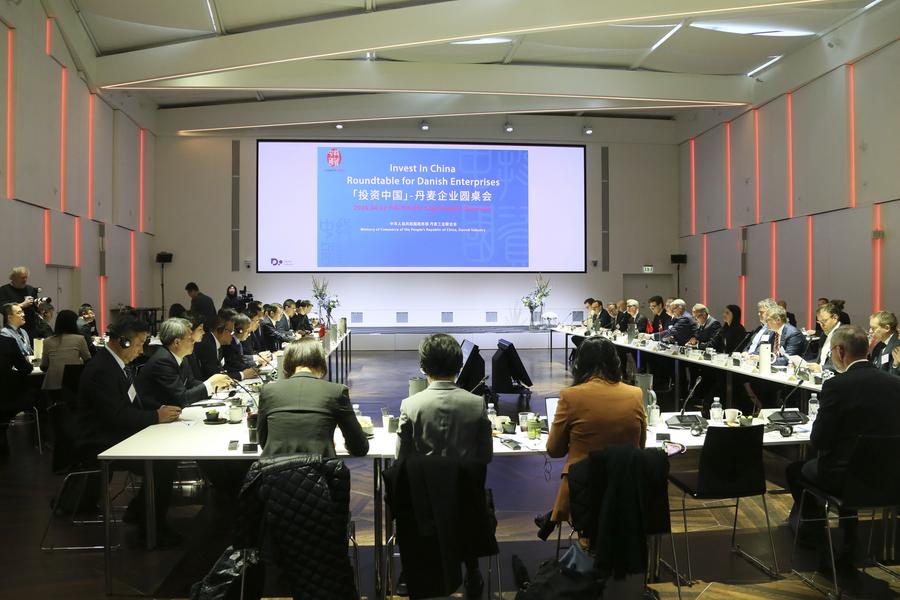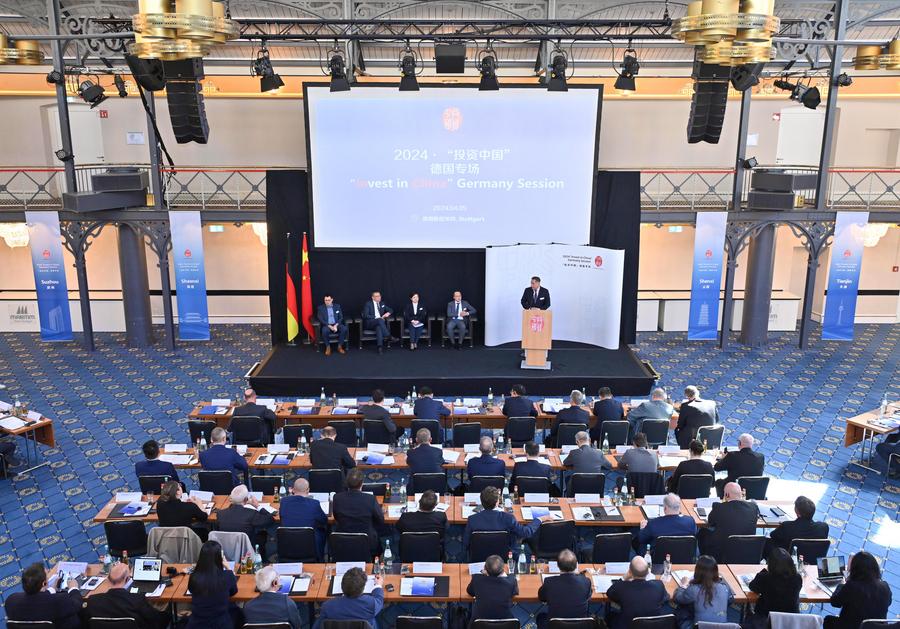Investing in China brings opportunities for prominent European companies
BERLIN, April 10 (Xinhua) -- In 1993, German company Kern-Liebers invested 500,000 German marks in Taicang, a city in east China's Jiangsu Province, embarking on its road of development in the foreign country with only six employees and a 400-square-meter factory house.
Three decades on, after 11 rounds of capital increases, the wire springs provider possesses factories spanning 70,000 square meters in the Chinese city and has witnessed an annual output value of 1.5 billion yuan (about 207.4 million U.S. dollars), accounting for the largest proportion of its global footprint.
"We have always felt strong support from the local government, and the difficulties and challenges we encountered were solved through our close cooperation," said Udo von Reinersdorff, chief financial officer of Kern-Liebers, at a roundtable held by the Chinese Ministry of Commerce last week in Stuttgart, Germany.
The event is one of an ongoing series of "Invest in China" roundtables that are touring European countries including Denmark, France and Italy. It has attracted a lot of well-known European enterprises from such fields as green energy, smart manufacturing, biomedicine, and high-end equipment manufacturing.
Participants shared their stories of vital investment in China and expressed their recognition of the Chinese government's efforts to facilitate the operations of foreign companies in the country, as well as their willingness to share future opportunities with the vibrant Chinese market.
VIGOROUS VITALITY
German companies are optimistic about China's economic prospects, which is important to Germany, said Hans-Peter Friedrich, a member of Germany's Bundestag, the lower house of parliament.
A report from the German Economic Institute shows that the country's total direct investment in China reached a record high of 11.9 billion euros (about 12.9 billion dollars) in 2023, a year-on-year increase of 4.3 percent. The value accounted for over 10 percent of Germany's total overseas investment, the highest level since 2014.

This file photo taken in 2018 shows a factory of German company Kern-Liebers in Taicang, east China's Jiangsu Province. (Xinhua)
Danish company group GN Store Nord came to China 150 years ago and started close cooperation with the country via a telegraph line. The headset manufacturer has now expanded its business in China into three major fields, including hearing aids, enterprise communications support and gaming equipment.
"The Chinese market today is not only very important for us, but also very important for global companies to fully function and be successful. Many things work well and we are grateful for the partnership," said the group's CEO Peter Karlstromer.
A.P. Moller-Maersk, a Danish shipping and logistics company that entered China 100 years ago, just concluded the celebration of the 30th anniversary of its first wholly-owned company in China at the end of March. The enterprise has more than 60,500 employees in the Asian country and has expanded its business scope from shipping to various fields including port investment and management, air freight, warehousing, as well as container manufacturing.
"Since Maersk started its business in Shanghai in the spring of 1924, China has been an integrated part of our history as a company," said Camilla Holtse, Maersk's head of public policy and regulatory affairs.
Holtse noted that the company also had a very extensive procurement program in China, with goods and services purchased at a combined value of up to 4.6 billion dollars in 2023.
Carlsberg, one of the world's leading beer makers, has invested more than 20 billion yuan (about 2.8 billion dollars) in China since entering the country in the early 1990s. With over 6,000 employees, it now has grown into the fourth-largest brewery in the Chinese market.
Carlsberg's public affairs manager Anders Kappel said that the company has greatly benefited from China's booming economic development.
GOVERNMENT EFFORTS
Over the years, China has sped up the implementation of a series of concrete measures, including reducing the negative list for foreign investment and implementing the Foreign Investment Law, to extend the benefits of its ongoing opening-up policy to more foreign companies.
In August 2023, the Chinese government put forward 24 specific measures in six areas to further optimize the foreign investment environment and intensify efforts to attract investment, including guaranteeing national treatment for foreign-funded enterprises, increasing financial and tax support, and fostering a world-class business environment that is market-oriented, law-based and internationalized.
The 24 pro-foreign investment measures have further strengthened the investment confidence of foreign-funded enterprises, said He Yadong, a Chinese commerce ministry spokesperson.

Participants attend Roundtable for Danish Enterprises of "Invest in China" in Copenhagen, Denmark, April 2, 2024. (Xinhua/Zhang Yuliang)
At the roundtable held in Copenhagen in early April, Lars Sandahl Sorensen, CEO of the Confederation of Danish Industry, hailed China's introduction of the 24 measures as a concrete and encouraging step towards improving the investment climate for foreign enterprises.
The policies for foreign investment companies could have an immediate impact on business confidence. The plan can go a long way to improving business confidence altogether, said Sorensen.
According to China's Ministry of Commerce, 60 percent of the announced measures have already been implemented. Items on the negative list for foreign investment have been reduced from 93 in 2017 to 31 in 2022, with further reductions expected this year. Also, all restrictions on foreign investment access to manufacturing are set to be lifted.
In March, China unveiled an action plan aimed to further attract and utilize foreign investment, outlining 24 measures across five key aspects such as expanding market access and aligning domestic regulations with high-standard international economic and trade rules. The action plan further underscores the country's commitment to attracting foreign investment and enhancing confidence in investing in China by strengthening positive interactions with the global economy.
The touring roundtables in Europe were part of a conference system initiated by China's Ministry of Commerce in July 2023, which is designed to convene regular meetings to address issues and gather feedback from foreign-funded enterprises.
To date, the ministry has organized over a dozen such meetings, resolving more than 300 issues and appeals raised, instilling optimism among many foreign institutions and enterprises regarding future investment and development prospects in China.
SHARED OPPORTUNITIES
Sorensen expressed willingness to further promote investment in the world's second-largest economy and to continue to cement the bonds between the two countries by leveraging their shared interest and common goals.
"Both Denmark and China are committed to further expanding our trade relationship, exploring new areas of cooperation, and embracing the opportunities presented by all industries, such as life sciences, biotech, green technologies, and food industry, among others," he noted.
In the view of Friedrich, it is important to understand China and have more exchanges with it, especially for young Germans who do not know about the country. "When you see this country, see its vitality, and see people's enthusiasm for the future, you will know how important the cooperation with China is to the German economy," he said.

This photo shows a scene at 2024 "Invest in China" Germany Session in Stuttgart, Germany, April 5, 2024. (Xinhua/Ren Pengfei)
Novo Nordisk, a global pharmaceutical giant, has approximately 65,000 employees in more than 80 countries and regions. Its subsidiary in China, founded in 1994, has expanded its business across a whole value chain, including production, research and development, and commercial operations.
Currently, the company has ongoing investment projects in Tianjin, a municipality in northern China, according to Katrine DiBona, corporate vice president of global public affairs and sustainability at Novo Nordisk. Last month, it announced an additional investment of about 4 billion yuan (553 million dollars) in an expansion project at its production base in Tianjin.
"We are very proud and excited to have such a big presence in China and it is our second largest market. We are very encouraged by the Chinese government's ambition and intention to develop a life science and bio-manufacturing hub as part of its industry," said DiBona.
With similar expectations, Karlstromer noted that the GN Group already has significant investments in China and has plans to modernize and invest more in the country.
"We are very grateful for the 150 years we have been together with China, and we look forward to continuing to work side by side to create a better future in close collaboration," he said.
Photos
Related Stories
- Hong Kong's new scheme to attract investment sees double-digit applications
- Profits of foreign-invested firms in China up 31.2 pct in first two months: data
- Interview: German "hidden champions" seek investment, cooperation in China
- More provinces are running fairs to further attract and utilize foreign investment
- Foreign enterprises eye bright prospects in Chinese market
Copyright © 2024 People's Daily Online. All Rights Reserved.









